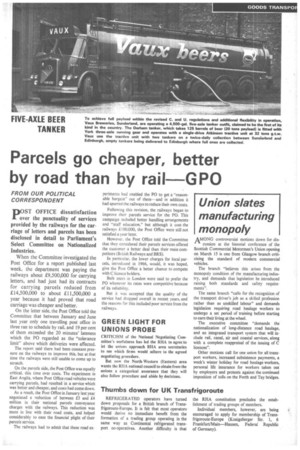Parcels go cheaper, better by road than by rail GPO
Page 29

If you've noticed an error in this article please click here to report it so we can fix it.
FROM OUR POLITICAL CORRESPONDENT DOST OFFICE dissatisfaction over the punctuality of services provided by the railways for the carriage of letters and parcels has been disclosed in detail to Parliament's Select Committee on Nationalized Industries.
When the Committee investigated the Post Office for a report published last week, the department was paying the railways about £9,500,000 for carrying letters, and had just had its contracts for carrying parcels reduced from £14,500,000 to about £11,500,000 a year because it had proved that road carriage was cheaper and better.
On the letter side, the Post Office told the Committee that between January and June last year only one travelling post office in three ran to schedule by rail. and 19 per cent of them exceeded the 20 minutes' lateness which the PO regarded as the "tolerance limit" above which deliveries were affected.
The report said there had been constant pressure on the railways to improve this. but at that time the railways were still unable to come up to scratch.
On the parcels side, the Post Office was equally critical, this time over costs. The experiment in East Anglia, where Post Office road vehicles were carrying parcels, had resulted in a service which was better and cheaper, and costs had come down.
As a result. the Post Office in January last year negotiated a reduction of between £3 and £4 million in their national parcels conveyance charges with the railways. This reduction was more in line with their road costs, and helped considerably to ease the financial plight of their parcels service.
The railways had to admit that these road ex
periments had enabled the PO to get a "reasonable bargain" out of them—and in addition it had spurred the railways to reduce their own costs.
Following this revision, the railways began to improve their parcels service for the PO. This campaign included better handling arrangements and "staff education," but although it cost the railways il00.000, the Post Office were still not satisfied a year later.
However, the Post Office told the Committee that they considered their parcels services offered the customer a better deal than their main competitors (British Rail ways and BRS).
In particular. the lower charges for local parcels, introduced in 1966, would, it was hoped, give the Post Office a better chance to compete with C licence holders.
Bulk users in London were said to prefer the PO whenever its rates were competitive because of its reliability.
But it was accepted that the quality of the service had dropped overall in recent years, and the reasons for this included poor service from the railways.
GREEN LIGHT FOR UNIONS PROBE
CRITICISM of the National Negotiating Committee's usefulness has led the RHA to agree to let the unions approach RHA area secretaries to see which firms would adhere to the agreed negotiating procedure.
But now the North-Western (Eastern) area wants the RICA national council to obtain from the unions a categorical assurance that they will also follow procedure and abide by decisions.




































































































































